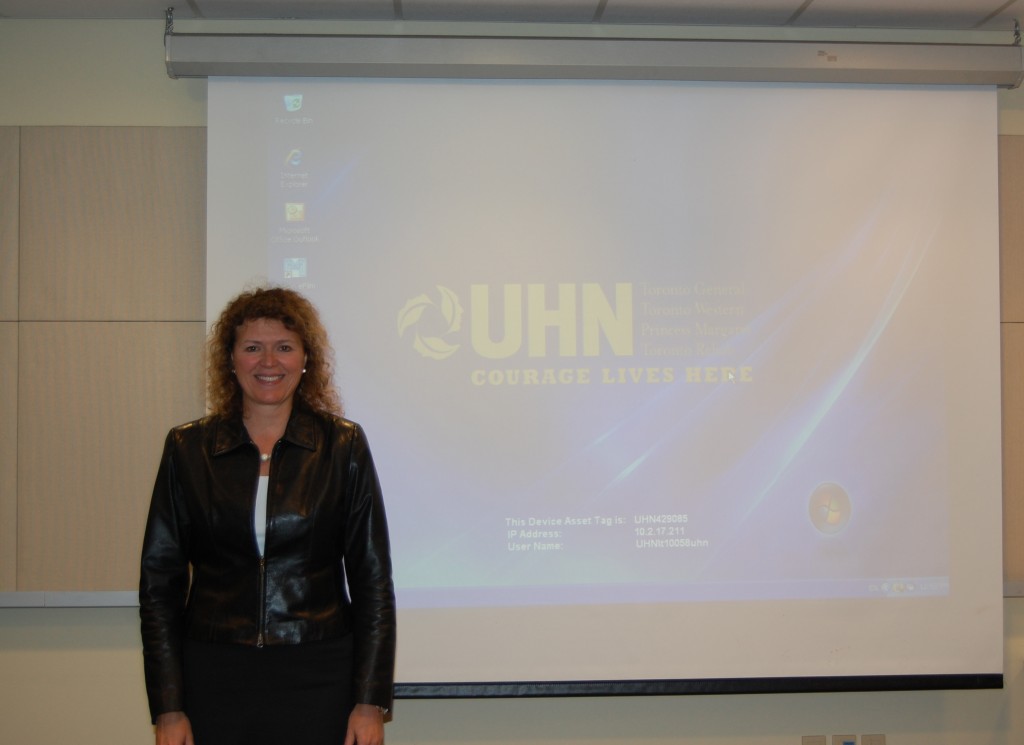Capturing the hot topic of hospital care for older adults, the third Toronto Academic Health Science Network (TAHSN) Nursing Grand Research Rounds showcased the topical and timely results of Dr. Kathy McGilton’s research. Interest in this Research Round extended beyond the host site, Toronto General Hospital (TGH) and was webcast live for interested attendees including the Centre for Addiction and Mental Health (CAMH). Dr. McGilton’s research findings gave an enlightening look at the current perceptions the health care system has of older adults, and how this patient group deserves the same chance at rehabilitation treatments as their younger counterparts.
”When patients reach a certain age we tend to focus on disabilities and most of these clients have a lot of remaining abilities; we just haven’t used the right assessments to tailor our care to work with those abilities,” said Dr. McGilton during the presentation held on March 18, 2013. “This research was wonderful journey in trying to improve and change practice in this area.”
The focus of Dr. McGilton’s research centres around elderly patients who face cognitive impairments, defined as either dementia, delirium or both, and the care they need, and deserve, to thrive. At the Research Round, Dr. McGilton addressed “Rehabilitating persons with cognitive impairment: Restoring success where once thought only failure lay.” These findings stemmed from a question posed eight years ago as to why people, who were older with a cognitive impairment, could not access active rehab beds in Toronto after sustaining a hip fracture. At the time, 17 per cent of patients who suffered a hip fracture had a cognitive impairment and were deemed by the health care system as ineligible for rehabilitation. As Canada’s aging population continues to increase, Dr. McGilton and her team of researchers sought to prove that rehab is just as beneficial to this patient group.
The in-patient centred model of care she and her team created for health care professionals was targeted to rehab clients who were older adults, 65 years and up and still living at home. Dementia and delirium management training was necessary for staff to understand the needs of these clients as was educating and supporting staff to transform their way of thinking to show this age group does deserve a chance. Patient families also required education and support to provide care after leaving the hospital.
“The question is to how to care for a population who are complex, elderly and sometimes can’t always tell us exactly how they think or feel,” said Dr. McGilton. “The approach needs to be implemented correctly, and it’s exciting as a nurse researcher when you can try to move the care system.”
Dr. McGilton’s research provides evidence that older adults with a cognitive impairment have a greater chance of returning home and retaining their independence through rehabilitation. Educating health care professionals and patient families to the needs and requirements of this group of patients, tailoring rehab care, which included one-on-one mentoring, and increasing the number of rehabilitation hours, instead of decreasing them, made a difference in patient outcomes.
“These patients are part of a vulnerable group who with proper post-surgery rehabilitation can thrive,” said McGilton. “Patients who have a cognitive impairment and have suffered a hip fraction continue to live a full life and my work will continue to develop and implement new models of care to help patients maintain their independence.”
The Research Round generated a lively dialogue with those who attended at Toronto General Hospital and webcasting counterparts at CAMH. They recognized the lack of nurses who are trained to care for older adults and the need for this specialization will only grow in the coming years. Dr. McGilton’s research shed key light on what is needed to provide for this population, and how the shift in care is not only physical but perception-based as well.
Information on the final Nursing Grand Research Rounds for the 2012/2013 series, to be held at the Centre for Addiction and Mental Health (CAMH) can be found here.
To view the seminar, please go here.
To view the January Research Round on Enhancing Care Transitions across the Healthcare System: Insights from Research and Innovation held at St. Michael’s Hospital please go to intro, Shari, Sonya, Lianne and Q&A.
